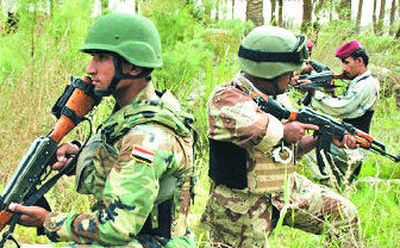Ambush leaves soldiers missing

BAGHDAD, Iraq – A massive aerial and ground manhunt involving hundreds of American and Iraqi troops was under way Saturday for as many as three U.S. soldiers missing after an organized assault on a military patrol south of Baghdad. The convoy was carrying seven U.S. soldiers and an Iraqi army interpreter, and five of them were killed.
The predawn attack occurred 12 miles west of Mahmudiyah, a volatile city nestled between the Tigris and Euphrates rivers in a region dubbed the “Triangle of Death.” It is known to be infiltrated by al-Qaida fighters and other Sunni insurgent groups. As of early Sunday, no group had asserted responsibility for the attack, U.S. military officials said.
In the hours after the assault and stretching into the night, American combat helicopters, unmanned surveillance drones and planes scoured surrounding areas, U.S. military officials said. Troops secured a wide perimeter, conducting door-to-door searches and erecting checkpoints to seal off roads and streets to prevent the missing soldiers from being transported out of the area. U.S. military officials also have enlisted local leaders in the search.
“Make no mistake,” Maj. Gen. William Caldwell, the military’s top spokesman, said in a statement. “We will never stop looking for our soldiers until their status is definitively determined, and we continue to pray for their safe return.”
A U.S. military source familiar with the manhunt said the two-vehicle convoy was struck with a roadside bomb, then was apparently ambushed by gunmen. Some of the soldiers had been shot. Flames consumed the vehicles, but it was unclear whether the explosion caused the fire or if it had been set later.
“It was a planned, coordinated attack,” the source said on condition of anonymity because he was not authorized to speak to reporters.
It was unclear whether the interpreter was among those killed or missing, said Lt. Col. Christopher Garver, a military spokesman. Nor was it clear whether the interpreter was a soldier or a civilian, Garver added. All of the soldiers were assigned to the U.S. Army’s Third Infantry Division.
Several hours after the attack, the military had identified only one of the slain soldiers, a U.S. military official said on condition of anonymity because he was also not authorized to speak to journalists. This suggested that the corpses may have been difficult to recognize.
“Something pretty horrible happened last night,” the official said.
The attack was the latest in a series of strikes against American soldiers in recent weeks that have generated high single-day death tolls. On April 23, twin suicide truck bombings killed nine soldiers and injured 20 at a remote combat outpost in Diyala province. On May 6, a roadside bomb stuck a convoy in Diyala, killing six soldiers and a Russian journalist, among eight U.S. soldiers killed that day.
The casualties underscore the growing vulnerability of U.S. troops as they increasingly live in and patrol hostile terrain under a new counterinsurgency plan intended to wrest control of areas from insurgents. But the offensive has also multiplied the risks for U.S. troops as their enemies use their knowledge of the land and sophisticated guerrilla tactics to target them.
Securing the violent areas around Baghdad has become a primary focus of the security plan launched in mid-February and the troop buildup ordered by President Bush. One of the five U.S. military brigades sent to Iraq as part of the “surge” deployed to the other side of the Tigris River from Mahmudiyah working to stop the traffic of explosives into Baghdad and to disrupt areas where insurgents are believed to hide and plan their assaults.
The patrol was attacked Saturday at 4:44 a.m.
“A nearby unit heard explosions and attempted to establish communications, but without success,” Caldwell said.
At 4:59 a.m., an unmanned surveillance drone relayed images of two burning vehicles. By 5:40 a.m., a U.S. quick reaction force had arrived at the scene, secured the site and launched the hunt for the missing soldiers, Caldwell said.
The mayor of Mahmudiyah, Mu’aiad Fadhil Hussein, said the attack happened near the village of Beshesha, west of the city. He described it as “one of the most dangerous areas of the city, in which Arab and Iraqi terrorists exist, and not even innocent civilians can enter it.”
A curfew has been imposed on Mahmudiyah and surrounding areas, he said, adding that “we, as a mayoralty, are working to provide intelligence information and moral support” to the U.S. and Iraqi forces conducting the search.
Sheik Abdullah Al Ghareri, a well-known preacher in Mahmudiyah, said U.S. and Iraqi forces, backed by helicopters and “tens of tanks,” were conducting search operations into the night and had made some arrests. Residents said that many insurgents had fled the city as U.S. forces entered it.
A senior Iraqi army official said he believed that the attack had been carried out by Sunni insurgents. “This area is really full of al-Qaida members,” the official said.
Sheik Mohamad Al Janabi, a reputed al-Qaida member in the nearby city of Salman Pak, said in a telephone interview that he was unable to contact his comrades in Mahmudiyah to determine whether they were responsible for the attack.
But, he added, “I can assure you that we will start pressuring Bush in a new way at the same time he is facing pressures from the Democrats and the American people. And there will be no problem to sacrifice 10 soldiers in order to abduct a single American soldier and get him on television screens begging for us to release him.”